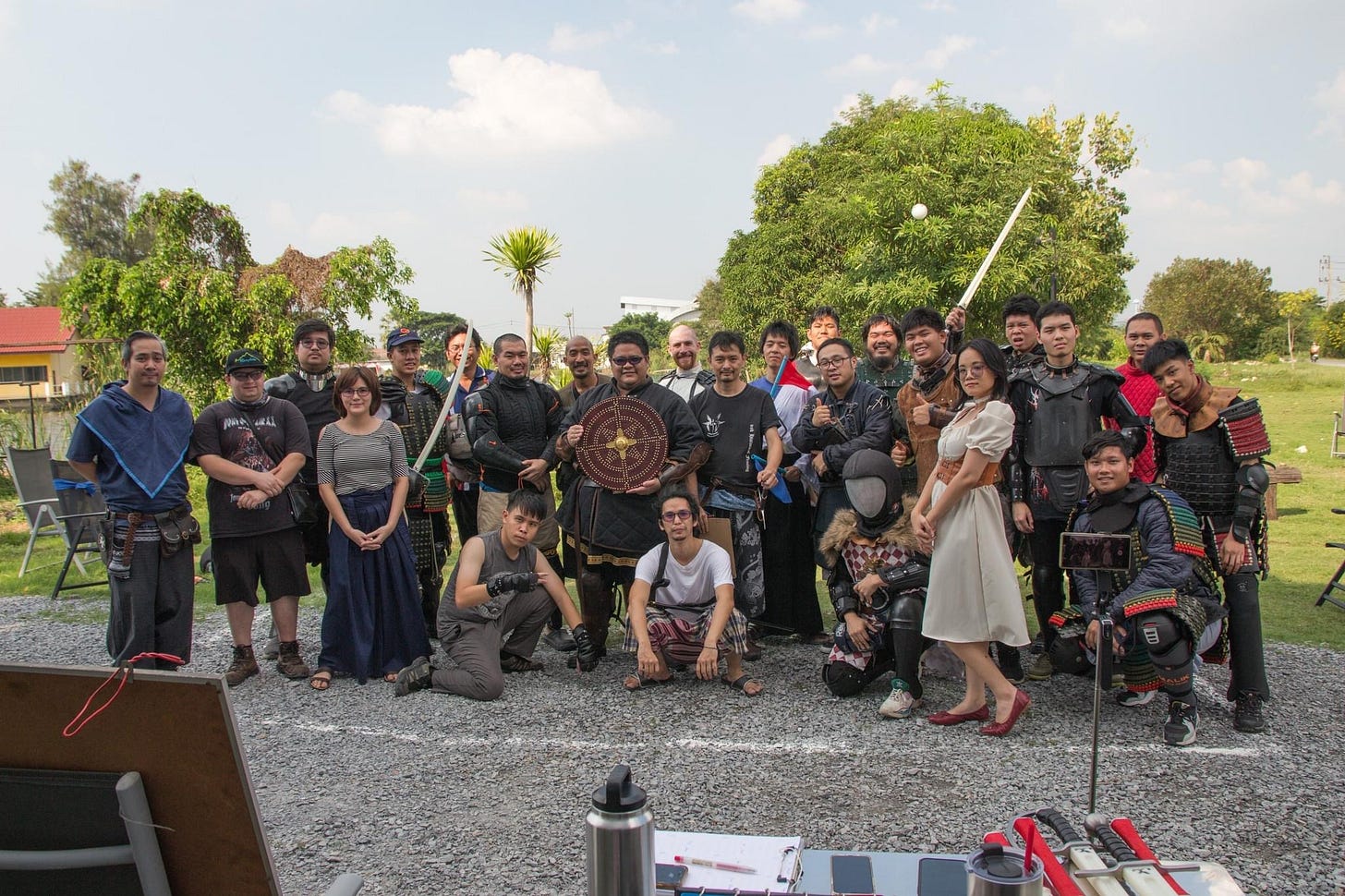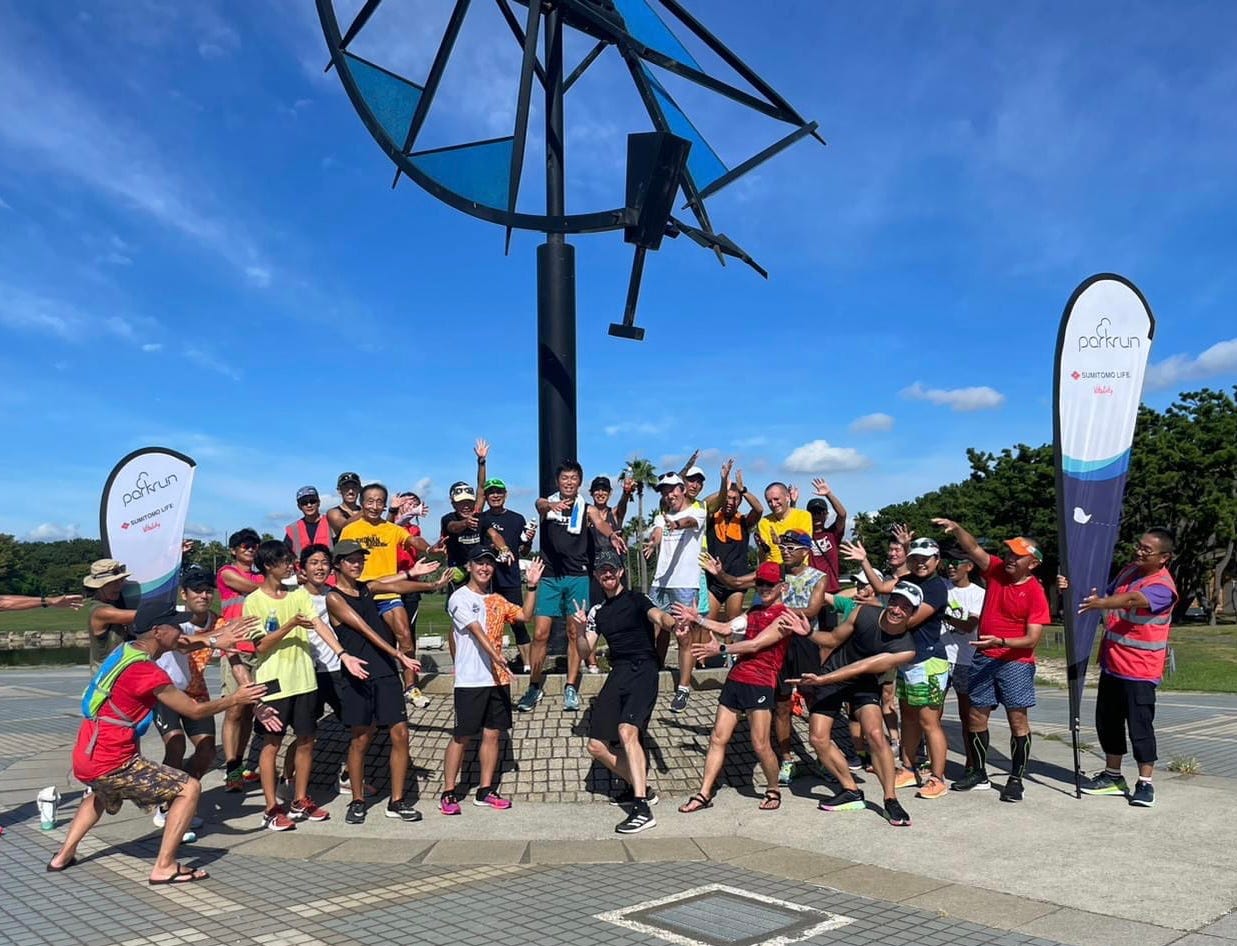Forging Bonds of Friendship (Running and Fighting)
"How do I make friends as an adult?"
When you are a kid, making friends is very easy. If a child doesn’t have anyone to play with, the first other kid they come across can become an instant friend through the most minimal of interactions. Language doesn’t even seem to be an issue a lot of the time, because children in airports will play with each other even when they don’t have a common language.
But making friends easily is something we “grow out of.” When we are growing up we are constantly surrounded by people who we have a lot in common with. Most ten-year-olds spend a lot of time in school hanging around with other ten-year-olds who all go to the same school, all know the same teachers, all study the same subjects, all live in the same area, etc, etc. But the older we get the less we have in common with the people around us and the more difficult it can be to make friends.
I ran a polls on both Twitter and Facebook and in general most people seem to be of the opinion that it’s not easy to make friends as an adult. I’ll run a poll here as well to see how my Substack audience feels.
When you move to another country it is an additional challenge If you are from the UK (like I am) and move to Japan (like I did) with no local connections other than work, then you have to start from zero again.
I know that the people who read my articles are all very well adjusted, beautiful, and intelligent people, so some of the things I’m going to discuss here won’t be new to you, but in this article I’d like to discuss my perspectives on forging strong bonds of friendship with people, even as an adult.
Starting at zero
I’ve had a few ebbs and flows in popularity during my life. The long and short of this is that I was a pretty mundane individual in most of my school life, I then became a lot more popular in college/university, I then moved to Japan (with zero Japanese) where I struggled for a while, and now after many years of living in Japan I have a friendship group I’m very happy with.
Before I moved to Japan there was always something to fall back on. I was a science dork in school, but I had other science dorks who were in the same classes as me to hang around with. But when I moved to Japan I was suddenly in a situation where my fall back point was my English speaking co-workers, most of whom were not British. Being co-workers and sharing a common language are not strong foundations on which to build friendships. In fact, I’d go as far to say that co-workers are not your friends. You can make co-workers into friends, but most people you work with are not and will not be your friends, and a few years after you leave your job you will forget those you haven’t befriended.
Being isolated like this can make you into a bit of a loaner. You can recede into doing things like scrolling endlessly on social media, playing video games, and refusing to interact with the rest of the world around you. Many people who move abroad (and to Japan especially) end up in this situation and it’s not good.
I was quite fond of video games back in the day but I didn’t let them take over my life. I came to Japan with other interests and it was following those interests that helped my situation.
Martial arts: Men are simple creatures
You know how I said earlier that kids can become friends through minimal interactions, and that those interactions can transcend language barriers? Well, that can be true for men as well. I’m not sure if this works in the same way for women (I have no experience being a woman), but men can be incredibly simple creatures.
I had a recent interaction on Twitter where someone said that men can bond over stupid or minor things. My response to this was:
Martial artists:
A: You like to fight?
B: Yes
A: I like to fight too.
B: Shall we fight?
A: Yes! Let’s fight!
It is often that easy.
When I came to Japan my Japanese was very limited. So one of the first things I did was look for a dojo and start training. I would work, study, and train. Working was a necessity and training was what I enjoyed doing. Studying Japanese helped me improve communication with my colleagues, but it also helped me communicate with my karate friends. Communicating with my karate friends was great practice, which reenforced what I studied, so bonding with people over “stupid/minor” things improved every aspect of my life.
Martial arts are not stupid or minor to me by the way. I take studying martial arts very seriously. But I don’t take martial arts or myself so seriously that I can’t admit the phrase, “I like fighting” contributes to some of this. And liking to play fight is stupid/minor.
I mentioned in a previous article that I entered a one handed weapons tournament while I was on a trip to Thailand. I don’t know anything about fighting with one handed weapons. Nor do I speak Thai to any useful level. But I had a great time at that event, made some friends (through engaging in mutual violence), and overall had a really great time in Thailand thanks to the connections I made.
So, to conclude this section, if you “enjoy fighting” (or more specifically are interested in martial arts) it’s very easy to have a dojo or club as an anchor point to make friends, and without the need for overly complex communication. The complex communication comes with time but on a base level, a mutual interest in combat sports is all you really need.
Runner friends (a HUGE resource)
I started running in August 2020. I was a very solo runner for quite a long time. I ran by myself in the mornings and evenings, and didn’t really talk to anyone during a run until I entered my first ultramarathon in October 2021. During that overnight 70 km run I had a lot of time to get to know some of the people I was running with and I made some great friends along the way. But I don’t run ultramarathons that often and don’t think it’s good advice to say to people, “If you want to make friends, just start running ultramarathons.” Because realistically, no one is going to do that.
Shorter running events however are much more accessible and can be a very good way to forge some great friendships.
That logic of, “You like to run? I like to run too! Let’s run!” is slightly more widely applicable than the martial arts example due to the perception of the lower injury rate. A lot of people run. There are running clubs everywhere. But in addition to running clubs there are also parkruns, which I think might be one of the greatest community wellbeing initiatives ever conceived.
For the uninitiated, parkrun is an event that started in the UK back in 2004 and has expanded into locations around the world. It’s a free, 5 km timed run that takes place on Saturday mornings. Anyone that follows me on Instagram will see me uploading parkrun posts on a weekly basis, usually from the Tsujido Kaihin Koen parkrun.
Not only has taking part in parkrun events improved my running (I tend to use parkrun as the one time a week were I run flat out for the duration of the 5k run), but I’ve also made a lot of friends. Not just the locals who take part in the event, but also the parkrun tourists that come to visit from all over the world. Also, although I haven’t been able to take part in other parkrun events yet, I know that if I’m in a town with a parkrun I can just turn up with my barcode and I will be welcomed with open arms.
When it comes to the friends I’ve made at parkrun, I also sometimes run with them at events other than our weekly 5ks. I’ve run marathons, ultramarathons, and other local events with my parkrun friends and I even just bump into people I know while running around the city.
Just like martial arts, it’s the common interest that unites people. I like to do martial arts so I make friends with other martial artists easily. I like to run, so I make friends with other runners easily. It’s the common interests that unite people.
Similar attributes and similar interests are not the same thing
If I could be friends with someone based only on their nationality and age then I could move back to the UK and have thousands of instant friends.
When I first moved to Japan I would seek out people who had similar attributes to me, with the hope that we’d get along based on our common backgrounds. This isn’t a good strategy for making long term friendships…or even short term friendships in my experience.
When you don’t have options you end up sinking to the lowest common denominator as a point of departure. For people who moved to Japan and don’t speak Japanese, that can literally be just a person that speaks English. That’s not a strong basis to form a friendship on.
I’m a British male in my late thirties living in Japan. If there was a conference of British males in their late thirties living in Japan, I bet I’d only get along with a small fraction of the attendees. But if there’s a martial arts or a running event, I would be very confident I could make friends there.
There’s nothing particularly insightful in what I am saying in this section, but it seems like a bit of a trap for people who are living abroad. If we made friends with people based on nothing but proximity and common attributes then everyone would have great neighbors and no one would ever move anywhere. But that’s not the world that we live in so I would advise seeking out people with common interests.
The language barrier
“How do I make friends as an adult?” is a common question. It seems like a lot of people haven’t figured this out. If you are living as an expat in a country where your mother tongue isn’t widely spoken then that is an additional hurdle. But because people who share a common language often don’t have this figured out I sometimes wonder if language is the most important factor.
If you are based in Japan and meet people you want to talk to then you will eventually figure it out. It will start off with gestures, but after some persistence (and studying) it will all work out. But if you don’t have anyone in your life that you want to communicate with then your motivation to figure it out is going to be extremely low.
Final thoughts
I went from socially awkward, to kind of popular, to having to start again completely in another country. I would say that making friends when I first came to Japan was tough, but I’m not really sure if that was the case. I forged some really strong bonds of friendship when I joined my first dojo in Japan and that became the place that I would go to train, socialize, and study practical Japanese. Outside of the dojo I had a harder time making friends because I would try to seek out people who I had similar attributes to rather than seeking out people with common interests.
I’ve moved a few times since I arrived in Japan and what I do now is to simply double down on what I’m interested in. I like martial arts and running so I find people that do martial arts or run and hang around with them. There’s absolutely no need to waste time trying to build relationships with people I have nothing in common with.
I’m at a point in my life right now where I don’t need to make a ton of new friends. But I do make friends quite easily now that I focus on spending time with people who are already interested in the same stuff I am.
To close I’d like to just highlight a comment I received fromMartial Xon Facebook because I think it’s quite insightful.
When I was in university I made a lot of friends for having a good time with. When I moved to Japan I was actively seeking friends to have a good time with, but found that friends of interest are much easier to make. And it’s only now that I’m much older that I realize that friendships of virtue are the ones of the most value.
I have a lot of running friends but it’s the running friends that are willing to run an ultra with me that are the keepers. I also have a lot of martial arts friends, but it’s the ones that try to kick my head off whenever we spar that are absolutely the keepers.
Thank you very much for reading. If you enjoy my work please share it with someone you think would also enjoy it.
If you aren’t subscribed, please sign up to keep up to date.
If social media is more your thing I’m active on Facebook, Twitter, and Instagram.
And if you are feeling generous but don’t want to commit to a monthly subscription, you can send a small donation to my Buy me a coffee page below.
Osu!











Whenever I read your entries and see all the things you're doing intensively, I think, "this guy must not be married" :)
Thank you for sharing this insightful article. The last paragraph may explain the reason soldiers who were in combat together often form strong, long-lasting friendships with each other.